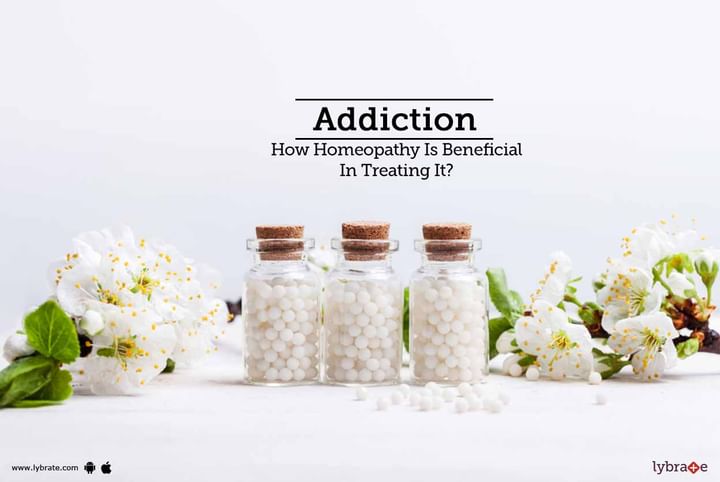Addiction - How Homeopathy Is Beneficial In Treating It?
Addiction not only includes physical things we consume, such as drugs or alcohol, but also includes virtually anything, such abstract things as gambling to seemingly harmless products, such as chocolate, etc. In other words, addiction may refer to a substance dependence (e.g. drug addiction) or behavioral addiction (e.g. gambling addiction).
Causes: There is a link between the repeated uses of an addictive substance and how the human brain experience pleasure, its use has a nice reward, leading to further and more frequent use. The addictive substance, be it nicotine, alcohol or some drug actually causes physical changes in some nerve cells in the brain. After a while, the user of the potentially addictive substance does not get the same pleasure and has to increase the dose, as his/her body's tolerance to it increases. Eventually, the user no longer experiences pleasure from the substance and takes it simply to prevent withdrawal symptoms taking the substance just makes them feel normal. When tolerance increases, the risk of addiction is much greater.
Signs and Symptoms: A person starts to show symptoms when a person takes the substance, such as nicotine , alcohol etc. and has given a serious attempt to stop, but is unable to do so because of the withdrawal symptoms. The body of an addict will go in withdrawal state when once the level of the substance abused is below a certain level. When a person goes in withdrawal state it will show signs, such as craving, bouts of moodiness, bad temper, poor focus, extreme temperament, poor focus, continuous feeling of depression, emptiness, frustration, anger, bitterness and resentment. Apart from these the addict will also display symptoms such as increased appetite, insomnia, constipation,and diarrhea. Withdrawal caused by some substances can also trigger signs like violence, seizures, hallucination, sweating and trembling, etc. However, the addiction continues despite health problem awareness. An addicted person commonly feels they need their drug in order to deal with their problems.
Investigation of Addiction: Blood test is advised to determine whether the substance is still in the blood (whether the substance has been taken recently). DSM criteria for substance dependence that is a patient diagnosed with substance dependence (an addiction) must meet criteria laid out in the DSM (Diagnostic and Statistical Manual of Mental Disorders), a manual published by the American Psychiatric Association.
What you can do?: Acknowledge the problem and consult for help from an expert. Family members must be supportive in creating a congenial environment for the addicted person.
Role of Homeopathy in Management of Addiction: The first step for the addicted person is to acknowledge that there is a substance dependency problem (addiction problem). The next step is to get help. In most of the world there are several support groups and professional services available. Treatment options for addiction depend on several factors, including what type of substance it is and how it affects the patients. Typically, treatment includes a combination of inpatient and outpatient programs, counselling (psychotherapy), self-help groups, pairing with individual sponsors, and medication.
Talking of medication, Homoeopathy definitely has a major role to play in the de-addiction journey of a 'patient'. Over the years it has been seen that homeopathy has produced tremendous results in such cases. People have approached for quitting alcohol, smoking, drugs, etc. and majority of them have been wonderfully helped by Homoeopathy. Those who haven't achieved desirable results have either lacked willingness or conviction on their own part, or have had a non-congenial and non-co-operative environment at home and work place. For any de-addiction plan to be successful for a patient these 2 factors are the most important. A willing person with a co-operative and supportive environment is much more receptive and responsive to the medical treatment.
The commonest attacking area for any addictive substance is the Central Nervous System (CNS). The substance inhibits the release of neurotransmitters, which are responsible for carrying nerve impulses. Once these neurotransmitters are inhibited in their normal functioning, a person develops delayed nervous responses and irregular nerve impulses leading to addiction. It is a vicious circle. So, as the centre of attack is the CNS, a medical system that boosts and strengthens the CNS would automatically prove beneficial in such dreadful cases. Homoeopathy is that very medical science! The homoeopathic medicines are absorbed through the nerve root endings of the tongue and directly hit the CNS. There are some very powerful Homoeopathic medicines, which have the ability to shake up the CNS and work in a normal manner as it is used to be. These Homoeopathic medicines, thus have the ability to develop control and also the power to abstain from the substance in later stages of the treatment.
But the first and foremost attempt is made to manage the withdrawal symptoms. It is the fear of the withdrawal symptoms only that a patient may lose conviction and confidence in him and give in to the indulgence once again. This is where the role of family and friends also comes in. when the struggle of 1 man becomes fight for the whole team; chances are very high of coming out victorious. There are brilliant medicines in Homoeopathic science, which can help the person in managing and fighting with the withdrawal symptoms with ease. Medicines like Nux vomica, Kali phos., Arsenic Album, Coffea cruda, Aconite, Gelsemium, Argentum nitricum, Ipecac, Acid sulphurosum, Caladium, Daphna indica, Quercus, etc. have proved to be extremely effective in helping a person wean off completely of the addictive substances.
Mind the Mind: Over the past two issues, we took up the burning problem of addiction as a mental illness, explored its, nature and probable causes that go into the making of an addict. The current issue is aimed at spreading awareness about the available evidence based psychological treatments for de-addiction.
- Psychotherapy: Also called as 'talk therapy', is aimed at helping the patient to understand the link between their thoughts, feelings and behaviour so that the maladaptive ones can be replaced with more adaptive and productive processes. Interventions in terms of Cognitive Behaviour Therapy (CBT), Motivation Enhancement Therapy (MET) and Behaviour Therapy are efficient in the treatment of addiction behaviour.
- Craving control: Use of certain medicines and behavioural techniques can help a person deal with the intense feelings of craving when it seems too much to bear. It gives a sense of greater control to the person over the substance, which in turn motivates him/her to stay away from using the substance. Many people report that they tend to continue the abuse the substance since they are unable to handle the period of intense craving, which can come all of a sudden.
- Relapse prevention: Arguably it is the most important component of de-addiction program. Leaving the substance is not that hard, but staying away from it is the most difficult part as reported by many patients with addiction. To ensure that the person stays clean and healthy without the substance, they are taught some techniques like asking for help whenever they feel the need to do the substance or staying away from potentially, dangerous situations, like going to party where alcohol is available. With therapy, the individual gains more confidence in his/her own abilities rather than depending on the substance for facing life situations. In addition to this, they also start enjoying their life without the substance. Both the patient and his/her family play an important part in this process hence they are educated about it and are advised regarding appropriate ways of ensuring sobriety for the patient.
- Alcoholics Anonymous (AA): It is a self-hellp group in which ex-alcoholics come together and share their experiences, for instance how they got into drinking, how it affected their life and now how they are maintaining their sobriety. These are mostly weekly sessions and have been found to be very effective in supporting the recovery of alcoholics to stay motivated and be clean without the use of alcohol. Similar to AA, there is NA (Narcotics Anonymous for drug addicts) and Al-Anon (for the family members and friends of problem drinkers).
- Yoga and exercise: A healthy daily routine with yoga or regular exercise promotes feelings of general well-being and ensures healthy mind and body. It detoxifies the body faster and even helps in recovering from the damage caused due to excessive substance use.
- Social skill training: An important aspect for being away from drugs/alcohol is the ability to say NO to such offers from others. Assertive behaviour, healthy communication pattern and good problem solving ability are skills that are taught to assist the person to stay healthy without feeling the need to take the substance.
One of the simplest, yet very powerful principles of staying healthy is 'ONE DAY AT A TIME'! Instead of making any long-term plans for staying sober, which might seem over-whelming and extremely difficult, just plan for that very day and DECIDE to be clean without the substance.



+1.svg)
